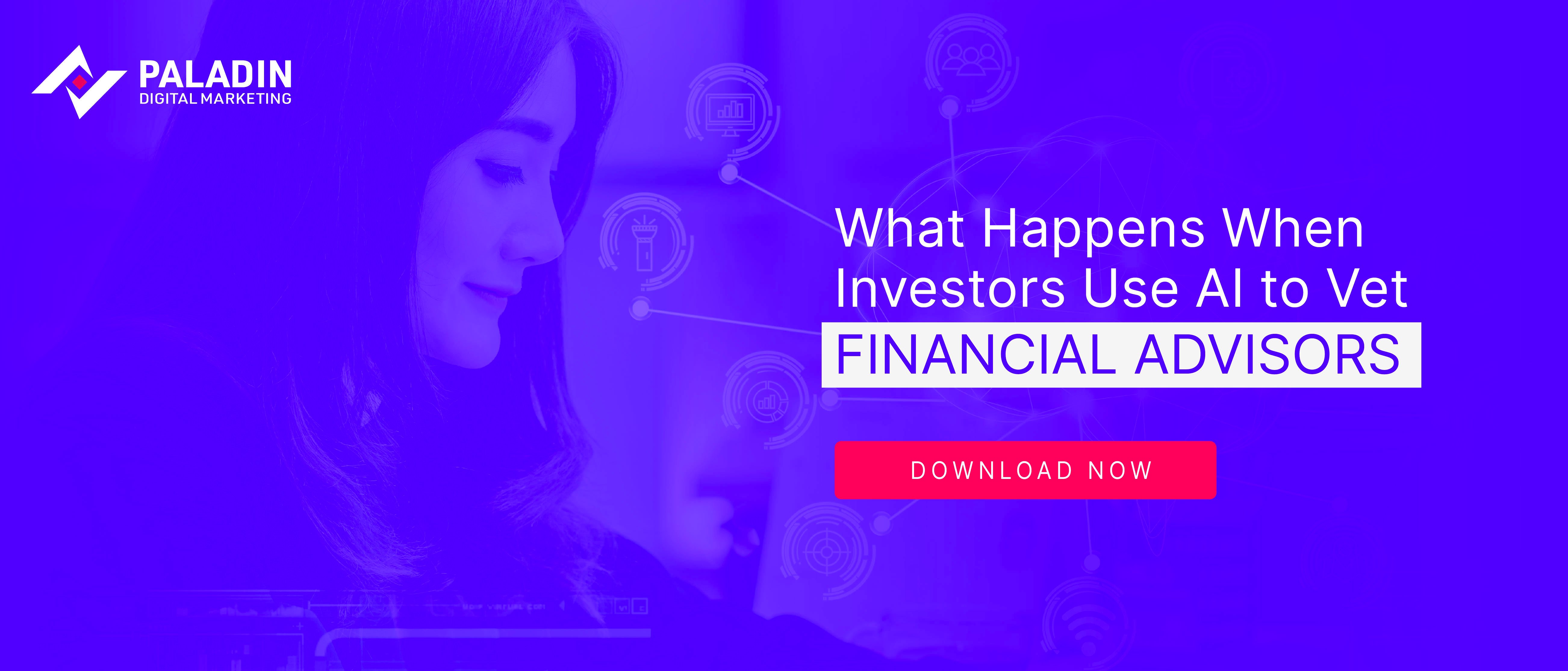

How Will AI Help Investors Select And Compare Financial Advisors?
For decades, choosing a financial advisor was a process shrouded in a certain mystique, largely dictated by the professionals and firms. They held the reins of information, dazzling potential clients with polished sales pitches, charming demeanors, and the weight of well-known brand names. Investors, often left with little more than a gut feeling or a glossy brochure, had to trust their intuition that these traits signaled financial competence and trustworthiness.
Get the right financial advisor marketing strategy! Connect with Paladin Digital Marketing today!
Then came the Internet in the late 1980s and Google in the late 1990s, game-changers that flooded the scene with data—reviews, bios, and credentials—empowering investors with more sources of information to evaluate their options. Yet, even online, advisors retained significant control, curating what appeared on their websites and shaping their digital personas.
Enter artificial intelligence, the next seismic shift in this digital landscape. AI doesn’t just amplify the volume of information; it refines it, sifting through the noise to deliver precise, actionable insights. With a handful of well-crafted questions, investors can now unlock a treasure trove of details about financial advisors—details that were once buried or glossed over.
This isn’t just a win for transparency; it’s a boon for high-quality advisors whose expertise and integrity can shine through the data. Ultimately, investors stand to gain the most, armed with the clarity to make smarter, more confident choices. In this article, we’ll explore the seven most common questions investors ask when scouring the web to find, vet, and compare financial advisors—and how AI can transform the answers into a roadmap for selecting the best financial firms and professionals.
The 7 Most Frequent Questions Investors Ask When Using the Internet to Find, Vet, and Compare Financial Advisors
The Internet has turned financial advisor selection into a research-intensive endeavor. Investors no longer rely solely on word-of-mouth or a firm’s reputation; they dig into websites, reviews, and public records. As AI steps into this space, it’s amplifying their ability to ask the right questions and uncover meaningful answers. Here are the seven queries that top the list—and how AI is revolutionizing the process.
-
What Are the Advisor’s Credentials and Qualifications?
Investors want to know if an advisor can handle their money. Are they a Certified Financial Planner (CFP®)? Do they hold a Series 65 license? In the past, verifying this meant wading through jargon-heavy websites or trusting self-reported claims of expertise and trust. AI changes that by quickly cross-referencing credentials with regulatory databases like FINRA’s BrokerCheck or the SEC’s Investment Adviser Public Disclosure (IAPD). It can flag discrepancies, expired certifications, or additional qualifications an advisor might not advertise. For example, an AI tool might reveal that an advisor touting a CFP® title let it lapse years ago—a red flag no investor would catch without digging deep.
-
What Is the Advisor’s Experience Level?
Experience matters, but it’s not just about years in the field—it’s about relevance. Investors ask: Has this advisor worked with clients like me? Have they navigated market downturns? AI can analyze an advisor’s career trajectory, pulling data from LinkedIn, firm histories, or even news mentions to paint a fuller picture. It might highlight that an advisor spent 15 years in corporate finance before pivoting to personal wealth management or consistently served high-net-worth individuals—details that signal whether their experience aligns with an investor’s needs.
-
Are There Any Complaints or Disciplinary Actions?
No one wants to hire an advisor with a checkered past. Investors turn to the Internet to unearth lawsuits, regulatory sanctions, or client complaints. Manually, this is a slog—BrokerCheck and IAPD are thorough but dense. AI streamlines it, scanning these databases and beyond (think court records or even social media grumbles) to compile a comprehensive rap sheet—or a clean bill of health. It might uncover a pattern of minor infractions an advisor downplays, giving investors the full story before they commit.
-
What Are the Advisor’s Fees and How Are They Structured?
Cost is a make-or-break factor. Is the advisor fee-only, commission-based, or a hybrid? Are there hidden charges? Websites often bury this in fine print, if they disclose it at all. AI can cut through the murkiness, extracting fee structures from disclosures, client reviews, or industry benchmarks. It might compare an advisor’s 1.5% assets-under-management fee to the 1% industry average or flag potential conflicts of interest with proprietary products in a commission-driven model—empowering investors to weigh true value against real cost.
-
What Do Other Clients Say About Them?
Reviews are gold but scattered across Yelp, Google, and niche financial forums. Some advisors even scrub negative feedback from their own sites. Investors want the unvarnished truth: Is this advisor responsive? Do they deliver results? AI aggregates this chatter, analyzing sentiment and spotting trends. It could reveal that an advisor gets glowing praise for communication but consistent gripes about slow follow-through—insights no single review might convey. By synthesizing hundreds of opinions, AI offers a balanced take on reputation.
-
What Is Their Investment Philosophy and Approach?
Does the advisor favor passive index funds or active stock picking? Are they aggressive or conservative? Investors need alignment with their goals, but advisor websites often lean on vague buzzwords like “client-focused” or “holistic.” AI digs deeper, parsing blog posts, podcasts, or public statements to decode their true stance. It might analyze an advisor’s commentary during the 2022 market dip to show they’re a buy-and-hold advocate or cross-check their claims against their portfolio holdings (if disclosed)—ensuring philosophy matches practice.
-
How Do They Compare to Other Advisors?
Comparison shopping is the Internet’s superpower, yet it’s tough to benchmark advisors side-by-side. Investors ask: Is this the best fit among my options? AI excels here, creating tailored scorecards based on the above factors—credentials, fees, reviews, and more. It might rank three local advisors, weighting experience higher for a retiree or low fees for a young professional. By distilling complex data into clear comparisons, AI turns a daunting decision into a logical one.
How AI Elevates the Search for High-Quality Advisors
These questions aren’t new, but AI’s ability to answer them is. It’s not just about speed—though it can process thousands of data points in seconds—it’s about depth. Where investors once relied on surface-level info or gut instinct, AI unearths nuance and context. It flags risks, highlights strengths, and personalizes results to an investor’s unique priorities. High-quality advisors with stellar track records, fair fees, and genuine client satisfaction benefit as their merits rise to the top. Shady operators, meanwhile, find it harder to hide behind slick marketing tactics and manipulative business practices.
This shift has broader implications. As AI tools become more mainstream, they could evolve into full-fledged rating systems. Imagine a “financial advisor score” blending objective metrics (knowledge, disciplinary history, fee competitiveness) with subjective ones (client sentiment, communication style). Investors could filter advisors like they do Amazon products—by star ratings, reviews, and fit. Firms might even adapt, prioritizing transparency to boost their AI-driven rankings.
Challenges and Caveats
AI isn’t flawless. Bad data in means bad data out—garbage reviews or outdated records can skew results. Privacy concerns loom, too; investors might balk at AI scraping their own financial profiles to match them with advisors. And let’s not forget human judgment: Numbers and algorithms can’t fully capture trust or chemistry. Still, as a starting point, AI’s precision is unmatched.
The Future Is Here
The days of picking an advisor based on a handshake and a smile are fading. The Internet cracked open the door to informed choices; AI is kicking it wide open. By tackling these seven key questions—credentials, experience, discipline, fees, reviews, philosophy, and comparisons—AI equips investors to find not just any advisor but the right one. High-quality professionals will thrive in this spotlight, and investors will reap the rewards of clarity and confidence. Ratings may be next, but for now, the power lies in the questions—and the answers AI delivers.

Jack Waymire, BA, MBA
Search Here
Categories
- AI (18)
- blogging (2)
- branding (1)
- content (12)
- custodians (1)
- Digital (345)
- email marketing (3)
- fcmo (2)
- fees (1)
- financial advisor marketing (62)
- Google (3)
- Ideas & Tips (78)
- Investor Experience (7)
- lead generation (7)
- linkedin (1)
- Marketing (371)
- newsletters (1)
- Online Transparency (2)
- search engine optimization (3)
- seo (9)
- Social Media (2)
- video (2)
- Websites (108)
- YouTube channel (2)
Recent Posts
-

-

How Financial Advisor Blogging Generates Thought Leadership and Leads
November 24, 2025 -

Top 5 Ways Digital Marketing Benefits Financial Advisors Seeking Leads
November 20, 2025 -

Trust Is The Biggest Online Marketing Challenge For Financial Advisors
November 17, 2025 -

Compliant Financial Advisor Bios Using AI Website Builders
October 22, 2025

